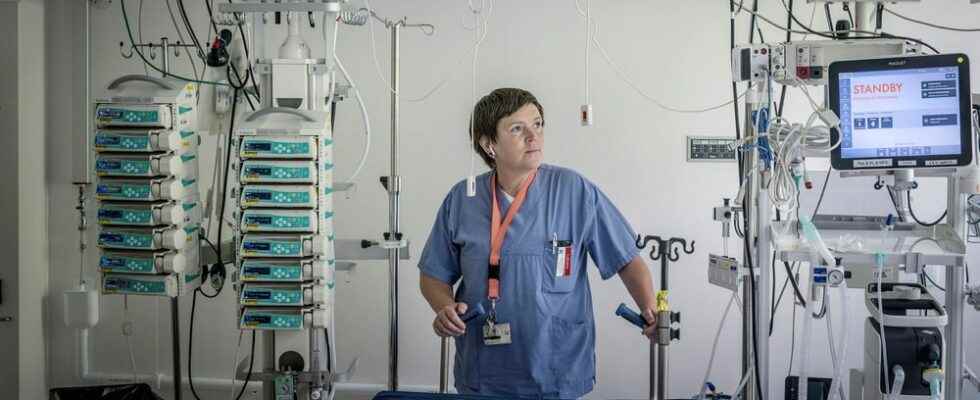On Wednesday, March 11, 2020, an elderly patient dies after a period of intensive care at Karolinska University Hospital in Huddinge – the first death linked to the corona pandemic in Sweden.
In Solna, on the other side of town, Susanne Rysz and her iva colleagues at Nya Karolinska did their utmost to prepare for what would prove to be the biggest ordeal for healthcare in modern times. Reports had already come from southern Europe about the patients’ serious illness and the great devastation of the virus.
– Everyone was a little scared, I was scared. Because my family would die, because everyone would die, she says.
The sweaty protective suits made it difficult for staff to both see and hear each other, while long lines in a field of seriously ill patients were constantly replaced, some recovered while others did not.
– We had to shout at each other to be heard behind the masks. There was an extremely large focus on protective equipment and on how we would be enough, says Susanne Rysz, who has been a specialist in anesthesia and also in intensive care for 15 years.
She describes a feeling of powerlessness. The usual methods used to treat other respiratory viruses did not work, while patients struggled for their lives with severe hypoxia.
– It was awful, nothing matched what we saw before. What we did did not work and it was extremely frustrating.
It was at this stage which Susanne Rysz, to deal with powerlessness, took to research alongside clinical work.
– I made observations, took samples, read and thought a lot about why some get seriously ill with covid-19, and why others do not.
In her studies, she has, among other things, mapped the pathophysiology of those who become seriously ill from the virus, ie what causes the disease and what characterizes those who become seriously ill. A possible common denominator she found in the hormone system RAAS.
In Susanne Rysz’s research, it was found that intensive care covid-19 patients had a disorder of some of the RAAS hormones compared with a healthy control group.
– To enter our cells, the sars virus needs to bind to a protein in the hormonal system RAAS. The system regulates, among other things, blood pressure and sugar metabolism, if you then have high blood pressure or diabetes you become extra vulnerable.
When the intensive care units began to fill to the brim of severely ill covid patients, it became clear, explains Susanne Rysz, the vast majority who became very ill from the virus had similar attributes.
– We saw a hugely homogeneous group. The vast majority were men between the ages of 55 and 70, a little overweight, almost always high blood pressure and often diabetic.
Many of the patients had undiagnosed so-called welfare diseases and had before the illness walked around with, for example, diabetes and high blood pressure completely unaware of their illness, according to Susanne Rysz. Others were aware of their illnesses but were not being medicated properly or adequately.
She has a hard time seeing how the hospital staff in Stockholm and Sweden could have done something different when the virus struck with full force, the knowledge about the disease was initially low all over the world.
– The only thing I think about on a personal level is why I did not have more knowledge about the previous SARS epidemic. The virus is very similar, I think we could have learned more from it.
But there was something to benefit from a medical point of view with the fact that the disease spread so fast around the world. All hospitals on all continents faced the same situation, although it would take a little longer for some.
– It is the first time in modern history that all hospitals have the same type of patients and now the world is so small, we helped each other in a very nice way – to understand what we were dealing with.
After two years of pandemic and with a dissertation behind her, the importance of public health work is what Susanne Rysz takes with her most.
– Virtually the whole world is on the way to an unhealthy life and this virus unmasked very unhealthy conditions. This is perhaps the most important thing that this pandemic brought with it, the realization that we are fundamentally ill.
Susanne Rysz presented her dissertation at Karolinska Institutet this spring. One of the studies was published last year in the scientific journal Nature Communications.
Disrupted hormonal system can be behind severe covid
In Susanne Rysz’s studies, there are scientific findings that suggest a connection between imbalances in the hormonal system RAAS, and the development of severe covid-19.
The dissertation is based on observations of intensive care covid-19 patients. In the studies, however, at the experimental level – where the hormone system RAAS has been manipulated in the same way as the virus works, she has found that disturbed levels of these hormones can mean a higher risk of severe covid disease.
Show more
Read more:
Therefore, coronary heart disease is increasing right now
Public Health Authority: Continue to stay at home if you have symptoms
